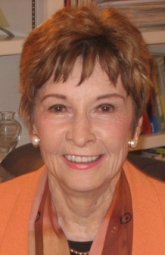We are deeply saddened to announce the passing of Peggy Papp, a deeply loved, and well-respected therapist who has been at the very heart of the Ackerman Institute for the Family for many years. Please join us in reflecting on the below piece by Evan Imber-Black, written in memory of Peggy’s life and legacy.
Peggy Papp (1923-2021)
Written by Evan Imber-Black, PhD
I want to tell you about Peggy Papp – Family choreography, metaphors, therapeutic debates, intergenerational themes and beliefs, the feminist critique – all these and more resound in the contributions of this amazing woman whose life we celebrate today.
Whenever I reread Peggy’s body of work, I am profoundly struck by the reach of her impact up and down the generations in Family Therapy, coupled by the foreshadowing significance of her inventiveness on our most recent models.
At a time when most middle-class women’s work was still largely in the home, Peggy wanted to wrap her arms around a meaningful career. When she wanted to leave acting in her 40’s and go to Hunter School of Social Work, she was told to prove she was serious by taking a job at Child Welfare for a year, and she did so.
Peggy discovered Family Therapy through seeing a tape of Nathan Ackerman. “I don’t know what he did or why he did it – I just knew it was powerful and that I wanted to devote my life to doing this,” she said. With the chutzpah of the inexperienced, she called Dr. Ackerman to ask for training – instead he offered her a job at what was the beginnings of the Ackerman Institute.
In 1977 she edited Family Therapy: Full length Case Studies, which set the standard for beautifully written cases that allowed us to get inside the moment by moment thinking of leading family therapists. Long before anyone was speaking about “therapist’s use of self”, Peggy managed to convince her quite famous contributors to reveal their struggles and their successes, originating our field’s ethic of transparency.
In 1983, Peggy wrote the acclaimed volume, The Process of Change, a book that went around the world influencing family therapy theory and practice.
In 1988, after a decade of work with Olga Silverstein, Betty Carter and Marianne Walters, these four women brought out The Invisible Web: Gender Patterns in Family Relationships. Rereading this gorgeous casebook, I was once again moved by Peggy’s collaboration with these amazing women and the ways they together built a shelter of feminist principles large enough and sturdy enough to bring us the premise that no therapeutic formulation is gender free and that all interventions must appreciate the ways that gender socialization disadvantages women. This contribution to the feminist critique opened a wide-angle lens, enabling a further focus on social class and race.
In 2002, Peggy corralled our attention in Couples on the Fault Line to the far more complex world of couples and couple therapy in the 21st century.
Never content to just rest, Peggy shifted her clinical attention to families with troubled adolescents, both in a project at Ackerman, and her dedicated work at Mount Sinai.
I once asked Peggy what her advice is for the younger generation of therapists – she said, “Tell them you have to be willing to be a perpetual student. If I get tired of working one way, I throw it out, I try something new and I’m a student all over again.”
I was fortunate to work with Peggy for ten years in our Themes Project at Ackerman, culminating in the journal article Family Themes: Transmission and Transformation.
Towards the end of her life, Peggy made it to Ackerman every week to work on the Couples Project with Michelle Scheinkman and Jean Malpas.
Peggy is survived by her beautiful and loving daughter, Miranda Adani, and by scores of friends around the world.
Peggy Papp was my most loving friend, my imaginative and courageous colleague – I am thankful for all she gave to me and Lascelles and to our field.
—Evan Imber-Black, PhD
